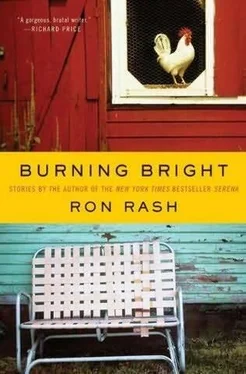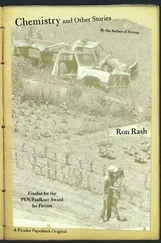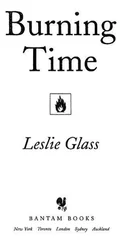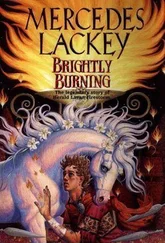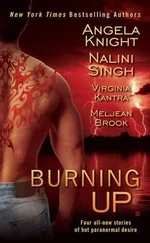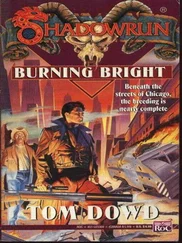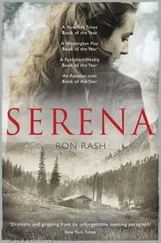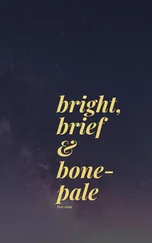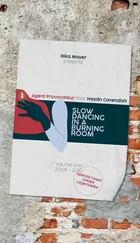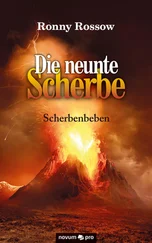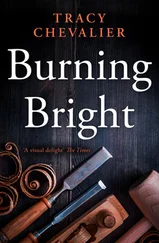As he approaches the farmhouse, he sees a candle in the front window, and he knows it has been lit every night for a month, placed there for him, to guide him these last few steps. But he does not go inside, not yet. He walks up to the springhouse and takes his helmet from the duffel bag. He fills the helmet with water and drinks.
His great-aunt had been born on this land, lived on it eight decades, and knew it as well as she knew her husband and children. That was what she’d always claimed, and could tell you to the week when the first dogwood blossom would brighten the ridge, the first blackberry darken and swell enough to harvest. Then her mind had wandered into a place she could not follow, taking with it all the people she knew, their names and connections, whether they still lived or whether they’d died. But her body lingered, shed of an inner being, empty as a cicada husk.
Knowledge of the land was the one memory that refused to dissolve. During her last year, Jesse would step off the school bus and see his great-aunt hoeing a field behind her farmhouse, breaking ground for a crop she never sowed, but the rows were always straight, right-depthed. Her nephew, Jesse’s father, worked in an adjoining field. The first few times, he had taken the hoe from her hands and led her back to her house, but she’d soon be back in the field. After a while neighbors and kin just let her hoe. They brought meals and checked on her as often as they could. Jesse always walked rapidly past her field. His great-aunt never looked up, her gaze fixed on the hoe blade and the dark soil it churned, but he had always feared she’d raise her eyes and acknowledge him, though what she might want to convey Jesse could not say.
Then one March day she disappeared. The men in the community searched all afternoon and into evening as the temperature dropped, sleet crackled and hissed like static. The men rippled outward as they lit lanterns and moved into the gorge. Jesse watched from his family’s pasture as the held flames grew smaller, soon disappearing and reappearing like foxfire, crossing the creek and then on past the ginseng patch Jesse helped his father harvest, going deeper into land that had been in the family almost two hundred years, toward the original homestead, the place she’d been born.
They found his great-aunt at dawn, her back against a tree as if waiting for the searchers to arrive. But that was not the strangest thing. She’d taken off her shoes, her dress, and her underclothes. Years later Jesse read in a magazine that people dying of hypothermia did such a thing believing heat, not cold, was killing them. Back then, the woods had been communal, No Trespassing signs an affront, but after her death neighbors soon found places other than the gorge to hunt and fish, gather blackberries and galax. Her ghost was still down there, many believed, including Jesse’s own father, who never returned to harvest the ginseng he’d planted. When the park service made an offer on the homestead, Jesse’s father and aunts had sold. That was in 1959, and the government paid sixty dollars an acre. Now, five decades later, Jesse stood on his porch and looked east toward Sampson Ridge, where bulldozers razed woods and pastureland for another gated community. He wondered how much those sixty acres were worth today. Easily a million dollars.
Not that he needed that much money. His house and twenty acres were paid for, as was his truck. The tobacco allotment earned less each year but still enough for a widower with grown children. Enough as long as he didn’t have to go to the hospital or his truck throw a rod. He needed some extra money put away for that. Not a million, but some.
So two autumns ago Jesse had gone into the gorge, following the creek to the old homestead, then up the ridge’s shadowy north face where his father had seeded and harvested his ginseng patch. The crop was there, evidently untouched for half a century. Some of the plants rose above Jesse’s kneecaps, and there was more ginseng than his father could have dreamed of, a hillside spangled with bright yellow leaves, enough roots to bulge Jesse’s knapsack. Afterward, he’d carefully replanted the seeds, done it just as his father had done, then walked out of the gorge, past the iron gate that kept vehicles off the logging road. A yellow tin marker nailed to a nearby tree said U.S. Park Service.
Now another autumn had come. A wet autumn, which was good for the plants, as Jesse had verified three days ago when he’d checked them. Once again he gathered the knapsack and trowel from the woodshed. He also took the.32-20 Colt from his bedroom drawer. Late in the year for snakes, but after days of rain the afternoon was warm enough to bring a rattler or copperhead out to sun.
He followed the old logging road, the green backpack slung over his shoulder and the pistol in the outside pouch. Jesse’s arthritic knees ached as he made the descent. They would ache more that night, even after rubbing liniment on them. He wondered how many more autumns he’d be able to make this trip. Till I’m seventy, Jesse figured, giving himself two more years. The ground was slippery from all the rain and he walked slowly. A broken ankle or leg would be a serious thing this far from help, but it was more than that. He wanted to enter the gorge respectfully.
When he got in sight of the homestead, the land leveled out, but the ground grew soggier, especially where the creek ran close to the logging road. Jesse saw boot prints from three days earlier. Then he saw another set, coming up the logging road from the other direction. Boot prints as well, but smaller. Jesse looked down the logging road but saw no hiker or fisherman. He kneeled, his joints creaking.
The prints appeared at least a day old, maybe more. They stopped on the road when they met Jesse’s, then also veered toward the homestead. Jesse got up and looked around again before walking through the withered broom sedge and joe-pye weed. He passed a cairn of stones that once had been a chimney, a dry well covered with a slab of tin so rusty it served as more warning than safeguard. The boot prints were no longer discernible but he knew where they’d end. Led the son of a bitch right to it, he told himself, and wondered how he could have been stupid enough to walk the road on a rainy morning. But when he got to the ridge, the plants were still there, the soil around them undisturbed. Probably just a hiker, or a bird watcher, Jesse figured, that or some punk kid looking to poach someone’s marijuana, not knowing the ginseng was worth even more. Either way, he’d been damn lucky.
Jesse lifted the trowel from the backpack and got on his knees. He smelled the rich dark earth that always reminded him of coffee. The plants had more color than three days ago, the berries a deeper red, the leaves bright as polished gold. It always amazed him that such radiance could grow in soil the sun rarely touched, like finding rubies and sapphires on the gloamy walls of a cave. He worked with care but also haste. The first time he’d returned here two years earlier he’d felt a sudden coolness, a slight lessening of light as if a cloud had passed over the sun. Imagination, he’d told himself then, but it had made him work faster, with no pauses to rest.
Jesse jabbed the trowel into the loamy soil, probing inward with care so as not to cut the root, slowly bringing it to light. The root was a big one, six inches long, tendrils sprouting from the core like clay renderings of human limbs. Jesse scraped away the dirt and placed the root in the backpack, just as carefully buried the seeds to ensure another harvest. As he crawled a few feet left to unearth another plant, he felt the moist dirt seeping its way through the knees of his blue jeans. He liked being this close to the earth, smelling it, feeling it on his hands and under his nails, the same as when he planted tobacco sprigs in the spring. A song he’d heard on the radio drifted into his head, a woman wanting to burn down a whole town. He let the tune play in his head and tried to fill in the refrain as he pressed the trowel into the earth.
Читать дальше
